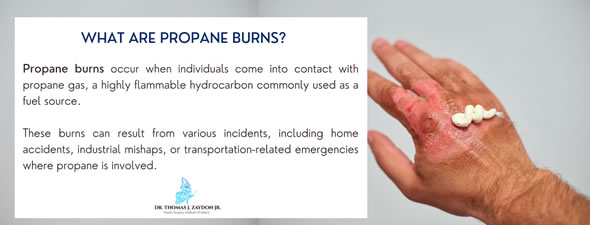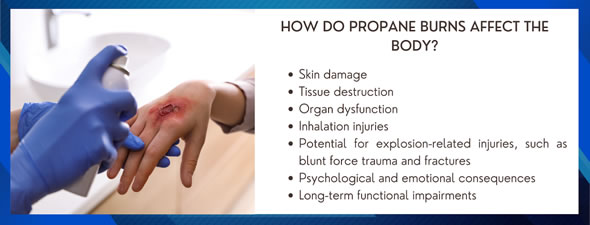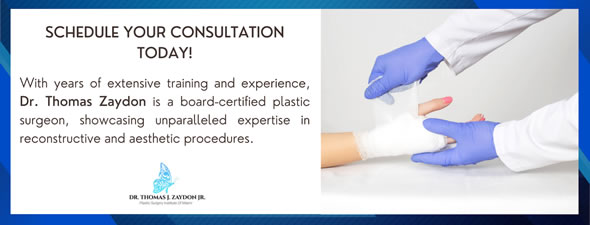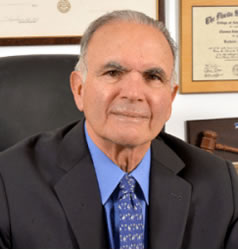In the aftermath of propane burns and explosions, the role of plastic surgeons becomes paramount in the journey toward recovery. Beyond the immediate response to injuries, these specialists play a crucial role in reconstructing lives physically and emotionally.

This blog post delves into the multifaceted responsibilities of plastic surgeons in propane burn cases, highlighting their expertise in helping patients achieve their physical and aesthetic goals.
What are propane burns?
Propane burns, a subset of thermal burns, occur when individuals come into contact with propane gas, a highly flammable hydrocarbon commonly used as a fuel source.
Propane, in its natural state, is a colorless and odorless gas. This inherent lack of detectable properties poses a unique challenge, as individuals may not know its presence until it ignites.
Unlike burns from solid materials or liquids, propane burns involve a gaseous substance, leading to specific injury patterns. These burns can result from various incidents, including home accidents, industrial mishaps, or transportation-related emergencies where propane is involved.
How do propane burns affect the body
Propane burns can have profound and multifaceted effects on the human body. The repercussions extend beyond the immediate site of contact, encompassing both superficial and deep tissue layers.
1. Skin damage
Propane burns cause extensive damage to the skin, ranging from superficial to deep tissue injuries. Superficial burns may manifest as redness and blistering, while deeper burns can result in charring and necrosis.
2. Tissue destruction
The intense heat generated during propane combustion can lead to the destruction of not only the skin but also underlying tissues, including muscles, blood vessels, and nerves. This extensive tissue damage poses challenges for reconstruction and functional recovery.
3. Inhalation injuries
In addition to cutaneous injuries, individuals exposed to propane burns may experience inhalation injuries. This can lead to respiratory distress, pulmonary complications, and long-term respiratory issues.
4. Potential for explosion-related injuries
Propane burns often occur in conjunction with explosions, introducing a unique set of challenges. Blast effects from the explosion can cause blunt force trauma, fractures, and injuries from flying debris.
5. Systemic impact
The systemic impact of propane burns goes beyond the immediate injury site. The release of inflammatory mediators and the body's response to trauma can lead to systemic complications, including organ dysfunction and a heightened inflammatory state.
6. Psychological and emotional consequences
Enduring propane burns and the subsequent treatment process can have profound psychological and emotional effects on individuals.
The visible scars and the trauma associated with the incident may lead to anxiety, depression, and a negative impact on overall mental well-being.
7. Long-term functional impairments
The extent of tissue damage in propane burns can result in long-term functional impairments. This may include limitations in range of motion, loss of sensation, and challenges in performing daily activities.
What is the role of plastic surgeons in propane burns and explosions?
Propane burns and explosions present a unique set of challenges that necessitate specialized care, and plastic surgeons emerge as key figures in the comprehensive management of these incidents.

Here's an in-depth exploration of the multifaceted role plastic surgeons play in the aftermath of propane burns and explosions.
Assessment and evaluation
Plastic surgeons conduct thorough assessments of propane burn injuries, considering the depth, location, and extent of the burns. This evaluation informs the development of a personalized treatment plan.
Given the complexity of propane burns, plastic surgeons collaborate with other specialists, such , respiratory therapists, and psychologists, to ensure a holistic approach to as trauma surgeons care.
Treatment planning and reconstructive procedures
Plastic surgeons utilize their expertise in skin grafts and flap surgeries to reconstruct damaged tissues. These procedures aim to restore both form and function, addressing the aesthetic and functional consequences of propane burns.
Staying abreast of advancements in reconstructive surgery, plastic surgeons may also employ innovative techniques to optimize outcomes, such as tissue engineering and regenerative therapies.
Body image restoration
Through open communication and empathy, plastic surgeons contribute to rebuilding the self-esteem and body image of survivors, addressing the visible scars and emotional toll of the incident.
Long-term rehabilitation
Plastic surgeons actively participate in the long-term rehabilitation of propane burn survivors. This includes addressing functional impairments, such as restoring mobility and sensation, to enhance overall quality of life.
Working closely with physical therapists, plastic surgeons contribute to developing rehabilitation plans tailored to each patient's specific needs.
Follow-up care and monitoring
Plastic surgeons provide ongoing follow-up care, monitor the progress of healing, and make adjustments to the treatment plan as needed.
Scar management is a crucial aspect of post-burn care, and plastic surgeons employ various techniques, including scar revision surgeries, laser therapy, and topical treatments.
Advocacy for patient well-being
Plastic surgeons act as advocates for their patients, coordinating care across various specialties and ensuring a seamless and patient-centric approach.
Furthermore, they can also empower patients and their families with information about the recovery process, potential challenges, and the importance of adherence to post-operative care guidelines.
What specific reconstructive procedures are commonly employed by plastic surgeons?
Plastic surgeons employ a range of reconstructive procedures to address the complex challenges posed by propane burns and explosions.
These procedures aim not only to restore the aesthetic appearance but also to enhance the functionality of affected areas. Some examples include:
- Skin grafts
- Flap surgery
- Tissue expansion
- Scar revision surgery, such as Z-plasty, W-plasty, and laser therapy
- Microvascular surgery
- Facial and eyelid reconstruction
- Hand reconstruction
- Breast reconstruction
These reconstructive procedures showcase the versatility and expertise of plastic surgeons in addressing the diverse challenges presented by propane burns and explosions.
The choice of procedure depends on the specific characteristics of the burn injuries, the location of the damage, and the overall health of the individual.
Are you in search of a distinguished and highly skilled plastic surgeon? Look no further than Dr. Thomas Zaydon at the Plastic Surgery Institute of Miami.

With years of extensive training and experience, Dr. Zaydon is a board-certified plastic surgeon, showcasing unparalleled expertise in reconstructive and aesthetic procedures. His expertise also extends in the medico-legal field as:
Contact us now to schedule your consultation!
The material contained on this site is for informational purposes only and DOES NOT CONSTITUTE THE PROVIDING OF MEDICAL ADVICE, and is not intended to be a substitute for independent professional medical judgment, advice, diagnosis, or treatment. Always seek the advice of your physician or other qualified healthcare providers with any questions or concerns you may have regarding your health.













